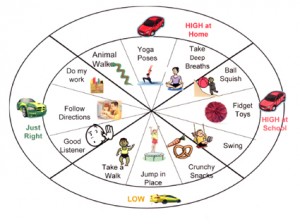Executive Functioning
Organizational skills are part of a skill set often referred to as executive functioning skills.
Here is a short video from Harvard University on Executive Functioning.
InBrief: Executive Function: Skills for Life and Learning
“Executive function is a set of mental processes that helps connect past experience with present action. People use it to perform activities such as planning, organizing, strategizing, paying attention to and remembering details, and managing time and space.”
Think about your child’s ability to:
- organize their belongings
- finish their work on time
- stay focused
- remember and write down assignments
Here is “Helping Students that Struggle with Executive Functioning” a PowerPoint presentation by Dr. Erica Warren. This presentation gives strategies to help your child develop their executive functioning skills based on the type of learner that they are.
Sources (and for more information)
Harvard University – Center on the Developing Child
National Center for Learning Disabilities
Self-Regulation
Self-regulation is another skill set that help children be successful both in and outside the classroom.
Being able to self-regulate means a child is able to remain calm, alert and focused. It often strongly linked to self-control and self-awareness. There have been several interesting studies related to a child’s ability to control their impulses or to “emotionally regulate” themselves. The most famous it the Marshmallow Experiment.
Barry MacDonald, the author of Boy Smarts, wrote about emotional regulation in his October Newsletter 2013. He includes a some ideas of activities you can do at home to develop a child’s ability to control their emotions and impulses. For example, make cookies that require time to chill, plant bulbs that will not sprout until later in the year, read a book only a chapter at a time or involve them in planning a family vacation.
When a child is experiencing stress, they burn energy. If they burn too much energy, they may become anxious, become sleepy or lose focus.
Children need to learn two things:
- What causes them stress and burns energy?
- What activities help them feel calm and creates energy?
“There are four key practices that [you] can undertake in order to enhance children’s development of self-regulation.
- BE A DETECTIVEI Try to figure out your child’s stressors, what helps the child stay calm and alert, what leaves a child hypo- or hyper-aroused?
- EXERCISEI For a child who wakes up irritable, exercise that works their deep muscles is very effective.
- MINDFULNESS PROGRAMS. By using mindfulness principles we can help children to identify their own arousal states. Try using the car analogy for example my engine is running really fast, really slow or just right….
- PLAY. When play emerges from children’s interests it will engage their focus. It will help them to consider the perspectives of others and figure out what they are thinking. Play encourages communication about wants and fosters connections between objects, people & ideas….”
Here is a great chart to help you determine what how to help your child when their engine is running high or running low.
It comes from the Occupational Therapy article you can find on the “I’m Worried About…. Social Emotional Concerns” page.
Read this Self Regulation Booklet by Dr. Stuart Shanker for more information.
Sources (and for more information)

